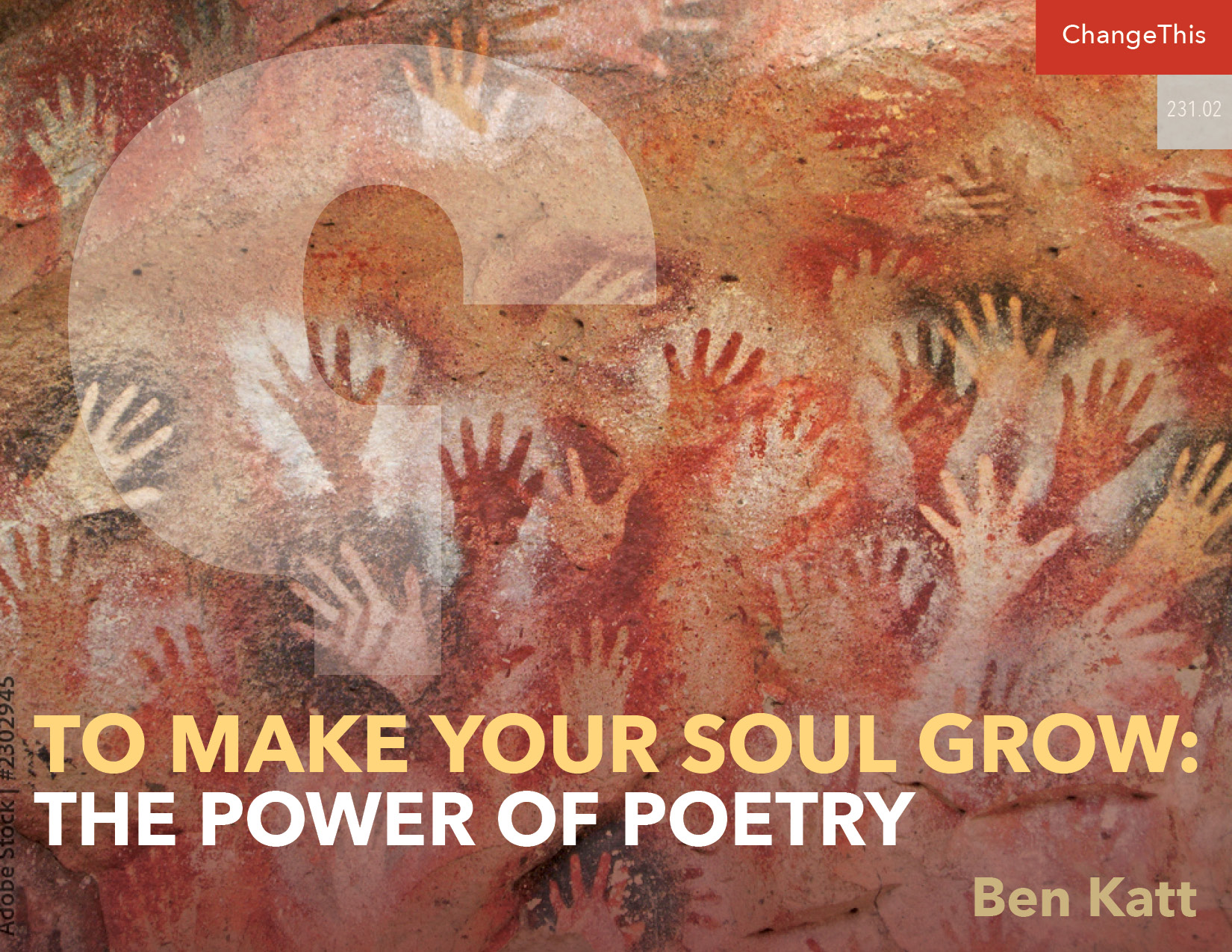To Make Your Soul Grow: The Power of Poetry
In 1994, a group of speleologists (they are cave scientists, I just really wanted to use that word) discovered one of the best-preserved prehistoric art sites in a cave in southeastern France. The figurative paintings at Chauvet–Pont d’Arc cave are estimated to be over thirty thousand years old, and include hand stencils, what seems to be a volcano spewing lava, and more than thirteen species of ice age lions, leopards, bears, and hyenas.
Chauvet cave and many of the countless other ancient rock art locations around the world—many of which are chronicled in the stunning Ancient Art Archive account on Instagram—are understood by anthropologists to be places where ancient rite of passage ceremonies were carried out. To mark their passage into adulthood and a new phase of responsibility, initiates went into the darkness.
And what did they do in the darkness?
They used their imaginations.
They told stories.
They painted.
They created.
Many thousands of years later I stumbled upon the power of creating in the darkness. As I transitioned into my full self, my “cave art” of choice was poetry. Initially, I held a candle up to the cave walls and read the poems of others. But as the darkness remained, it didn’t take long to notice that there were aches, confusion, and longing within me that needed to be expressed. So I started to sketch my own simple poems.
As poet and civil rights activist Audre Lorde observed, poetry has the power to “give name to the nameless so it can be thought.” That’s what I began to experience. Creating poetry reflected back to me what I could not see. It helped me welcome home rejected parts of myself. Creating poetry became a comforting companion amid disorientation and restlessness. It put some shape—not too rigid or overdefined—to the formless and void phase I was in.
I usually wrote in free form. No rules for structures, like a predefined meter, syllable count, or rhyme scheme.
Often, if a poem I read stirred something in me, I would use it as a jumping off point to dig into what I was feeling. One day I was inspired by a snippet from David Whyte’s “Winter Grief” that captured the experience of being in a liminal space. As if I was having a conversation with Whyte’s poem, I pulled out my notebook and wrote a brief poem for myself, with no plan to share it with anyone (you’ll see why, I’m no Shakespeare):
I am indeed in a season of in between
Still close to the things I’ve left
And who I’ve been
And what I’ve believed
Too close to it all
And yet knowing
I am becoming
And searching
For who I will be
The shape of my soul
The contours of my community
The outline of my work
All of this feels too far away
I long to be nearer to what is emerging
Than what has been
But I know no way to accelerate the journey
Occasionally, I would write haiku, a Japanese poetry style made prominent by Basho in the seventeenth century. A haiku includes a first line of five syllables, a middle line of seven, and a final line of five. Five-seven-five. Haiku is often about a specific event and appeals to the senses. For example, I wrote a haiku about a cat encounter I had one night while I was sitting on my front porch:
A visitation
At dusk, guest uninvited
The stray cat appears
But mostly I avoided any poetic constraints, even though they can be creatively helpful. I knew I just needed to let it flow. To create. To make. Unrestricted. No judgment. I let the words bubble up from within and out onto the page.
Poetry doesn’t have to be sophisticated. You don’t need to be sitting by a fireplace, wearing a cardigan, and smoking a pipe to write poetry. Poetry can be simple. Regardless of how you go about it, creating poetry will cultivate curiosity, awe, and gratitude within you. All of which are sustenance for the dark night of the soul.
In fact, poetry doesn’t need to be your preferred form of “cave art.” Any form of creative expression can be supportive during your dark night. Compose songs. Make a quilt. Pull out a canvas and splatter paint on it. Create anything; just create something.
Kurt Vonnegut, author of satirical works like Slaughterhouse-Five, once described the power of creating in a letter he wrote in response to an inquiry from a high school class:
“Practice any art, music, singing, dancing, acting, drawing, painting, sculpting, poetry, fiction, essays, reportage, no matter how well or badly, not to get money and fame, but to experience becoming, to find out what’s inside you, to make your soul grow.”
For me, the added benefit of creating something, even a small something, was that it felt really good! It was satisfying to complete mini projects. As I walked through the dark, I couldn’t tell if I had traveled an inch or a mile. The act of creating, however, assured me that I was growing. Not the kind of growth that I used to look to in order to determine my worth in the world—the way I approached roles and projects and success, all related to seeking the approving gaze of others.
This was a different kind of growth. Not an ascending to higher levels of influence and wealth or achievement, but a descending kind of growth. I was undergoing. I was becoming.
Excerpted from The Way Home: Discovering the Hero’s Journey to Wholeness at Midlife by Ben Katt, published by St. Martin’s Essentials. Copyright © 2024 by Ben Katt.




